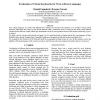Free Online Productivity Tools
i2Speak
i2Symbol
i2OCR
iTex2Img
iWeb2Print
iWeb2Shot
i2Type
iPdf2Split
iPdf2Merge
i2Bopomofo
i2Arabic
i2Style
i2Image
i2PDF
iLatex2Rtf
Sci2ools
LREC
2008
2008
Evaluation of Virtual Keyboards for West-African Languages
West African languages are written with alphabets that comprize non classical Latin characters. It is possible to design virtual keyboards which allow the writing of such special characters with a combination of keys. During the last decade, many different virtual keyboards had been created, without any standardization to fix the correspondence between each character and the keys to press to obtain it. We define a grid to evaluate such keyboards and apply it to five virtual keyboards in relation with the five main languages of Niger (Fulfulde, Hausa, Kanuri, Songhai-Zarma, Tamashek), Bambara and Soninke from Mali and Dyoula from Burkina Faso. We conclude hat the African LLACAN keyboard should be recommended in Niger because it covers all the characters used in the alphabets of the main languages of this country, it produces valid Unicode codes and it minimizes the number of keys to be pressed.
| Added | 29 Oct 2010 |
| Updated | 29 Oct 2010 |
| Type | Conference |
| Year | 2008 |
| Where | LREC |
| Authors | Chantal Enguehard, Harouna Naroua |
Comments (0)

